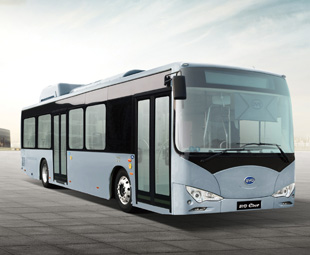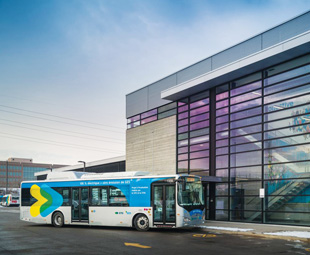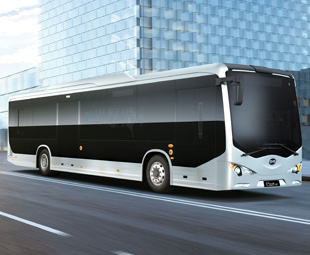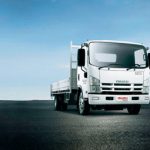Africa’s first electricity buses on the way!

Cape Town’s public transport system is going green as the city prepares to procure electric buses for its MyCiti bus service. THATO TINTE looks into other cities that have adopted this form of transport and shares some insights.
New York, Rio de Janeiro, London, Vienna and soon Cape Town – these are some of the progressive cities around the globe that have successfully rolled out electric buses within their public transport systems.
Technology first brought us e-mail, e-commerce, e-books and now we have e-buses (we promise this is not a Zulu lesson). These “green fleets” are fast gaining global popularity as environmentally friendly buses that will help reduce carbon emissions in the public transport system.
On January 20, Patricia de Lille, executive mayor of Cape Town, announced that the city intends to purchase electric buses for its bus rapid transit (BRT) system, MyCiti.
This will mean replacing the city’s current fleet of diesel buses with the 12-m, eco-friendly electric buses. These will be the first electric buses used for public transport in Africa.
De Lille says that these buses will be able to travel for at least 250 km in traffic before the batteries need to be charged, and that charging stations as well as the necessary training for drivers and engineers will be provided.
Alternative fuel experts say that 97 percent of public transport across the world operates on diesel and that, by 2025, global cities will represent 80 percent of energy use and carbon emissions on the planet. This makes it imperative for global public-transport communities to find ways of easing the environmental impact.
 As the introduction of these buses is still at conceptualisation stage, with the service-provider tender only advertised in early February, it is still unclear when these buses will make their debut in the city, how the logistics will work and how public concerns will be addressed. These concerns include:
As the introduction of these buses is still at conceptualisation stage, with the service-provider tender only advertised in early February, it is still unclear when these buses will make their debut in the city, how the logistics will work and how public concerns will be addressed. These concerns include:
• How long the buses will take to be charged;
• Where the charging stations will be situated;
• What measures will be in place in case of load shedding; and
• How fare prices will be managed when electricity tariffs increase.
Despite some concerns, these buses can offer great environmental and operational benefits and the City of Cape Town has the opportunity to proactively learn from the experiences of other cities that make use of electric buses.
In China, the Build Your Dreams (BYD) electric bus called K9 is an all-electric bus model manufactured by Chinese automaker BYD Coach Company. BYD is a leading global manufacturer of electric buses.
The bus has similar specifications to those that the City of Cape Town is planning to purchase and has a range of 250 km on a single charge under urban road conditions.
This “pure electric” transit bus, which was launched in Changsha, China in 2010, is also being assembled in the United States of America. It has been tested and is being used in other countries including Japan, Colombia and the Netherlands.
According to the BYD website, the K9 buses have different charging capabilities, which range from three hours to overnight, depending on the power required.
BYD states that the buses are powered by lithium-ion phosphate batteries, which were developed in house and utilise the most efficient battery technology currently available. Power is also provided by the company’s in-wheel motor drive system and solar panels on the on-board batteries.
 Further insight can also come from Siemens which, in 2014, built its first electric bus in Austria, together with public transport company Wiener Linien. This helped establish Europe’s first fleet of mass-produced, quick-charge, fully electric buses.
Further insight can also come from Siemens which, in 2014, built its first electric bus in Austria, together with public transport company Wiener Linien. This helped establish Europe’s first fleet of mass-produced, quick-charge, fully electric buses.
The Siemens-Rampini bus – which is comparable to the BYD K9 – gets its energy from the overhead power lines used for trams in the Austrian city, Vienna. The buses, coined “eBuses”, recharge their batteries in ten to 15 minutes. The three-phase, 85 kW (114 hp) AC motor from Siemens also acts as a generator.
A study of electric buses, conducted by the Volvo Group and accounting firm KPMG, reveals that electric buses can help save in running costs in addition to the societal and environmental benefits.
Research presented at the African Union of Public Transport (UATP) Workshop, hosted by Transport for Cape Town in late 2015, revealed that buses running on electricity or gas can cover a greater distance than buses running on diesel when using the same amount of energy.
UATP also provides a list of benefits of electric buses. These include that they produce zero carbon emissions and have lower operational and maintenance costs, as they have fewer parts to service. The motors also produce less heat and noise and provide a more pleasant ride for the driver and passengers.
As the city of Cape Town considers a long-term goal of utilising electric double-deck buses for longer distances, Cape Town Mayoral Committee member and Transport for Cape Town councillor, Brett Herron is enthusiastic about the reduction of noise pollution produced by these buses.
As MyCiti continues to make progress, FOCUS will keep you updated on these exciting developments.
Published by
Focus on Transport
focusmagsa




